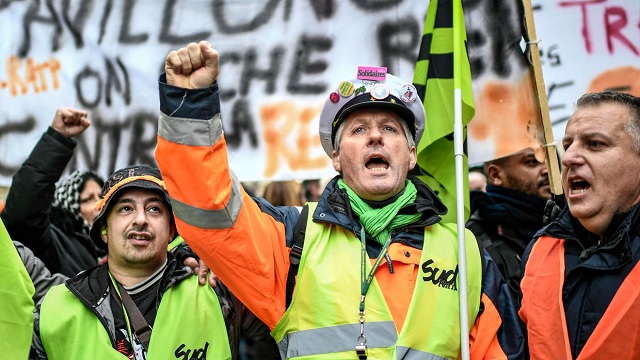
Paris, France | AFP | France, it sometimes seems, is either in the throes of a major strike or facing the looming shadow of one.
Workers in the country go on strike more than most nations in Europe. The current open-ended stoppages, which began on December 5, have halted most public transport in Paris and inter-city trains.
Why do the French strike so much?
The reasons, analysts say, are multiple and complex, and touch on the French republic’s revolutionary origins, its educational philosophy, union traditions and even the electoral system.
“I cannot say if France is the most strike-prone country in the world but it is certainly a country… that is above the European average, and always near the top,” researcher Kurt Vandaele of the European Trade Union Institute (ETUI) told AFP.
Into its fourth week, the transport strike against planned pension reforms is the biggest work stoppage in decades, outlasting the 22-day strike of 1995 that ultimately saw the government capitulate.
France has had a rail strike every year for 72 years since 1947, according to the state-owned SNCF railway company.
And figures from the labour ministry show that from 2005 to 2017, 118 work days were lost to strike action per 1,000 private sector workers on average per year.
The analysis included strikes at state-owned transport companies SNCF, RATP and Air France, but not the public sector where workers are much likelier to down tools.
Among 23 countries for which the International Labour Organization counted “days not worked per 1,000 workers due to strikes and lockouts” in 2016, France came second after Argentina.
An ETUI chart of average strike days in Europe from 2010 to 2017 lists France second after Cyprus, though data for “strike-prone” Greece and Italy was not included.
A comparison of OECD countries by the Hans Boeckler Foundation saw France top a list of working days lost per 1,000 employees from 2008 to 2017 — beating Denmark, Belgium, Canada, Spain, Norway, Finland, Britain, Germany and the United States, among others.
– ‘Built on revolt’ –
“Yes, one can say there is a real strike culture in France” — closely tied to a long history of revolt, according to Jean Garrigues, a historian at the University of Orleans.
“Modern France was built on revolt,” Garrigues told AFP, pointing to the 1789 revolution that toppled the monarchy and gave rise to the first French Republic in 1792.
“There is a general conviction that revolt is necessary, that violent means or at least forceful means are necessary” when you do not agree with the government, he said.
Polls show a majority still sympathise with the current strikers, despite millions of commuters having to get up earlier, walk further, and jostle for space on infrequent and overcrowded trains and buses.
“The French spirit, if there is one, is one of scepticism,” Jean-Pierre Durand, a professor in labour sociology, told AFP.
“Rene Descartes’ ‘I think, therefore I am’ can easily be translated for the French as ‘I question, therefore I am’,” he argued.
“This means that as soon as any reform is announced, a large number of French people start questioning… where the traps are.”
Garrigues also pointed to France’s system of direct presidential elections.
“It implies a somewhat irrational attachment to one man — a near religious belief in the ability of one man to change everything,” he explained.
“And necessarily, such focus on one person, on the president of the republic, leads to disappointment. Cumulative disappointments lead to a… loss of trust, and a loss of trust leads to revolt.”
– ‘Unions unable to influence’ –
The right to down tools was one of the first social rights acquired by the French, in 1864.
And it has been used often, perhaps most prominently in 1968, when the government raised the minimum wage after a student revolt morphed into mass protests and a wildcat strike that paralysed the economy.
In France, unlike many other countries, withholding labour is an individual civil right unrelated to whether one is a union member or not.
French distrust of politics and authority also extends to unions, analysts say, which is why workers are willing to strike, sacrificing their pay, to try to ensure their voice is heard.
According to ILO statistics, only eight percent of French workers — even less in the private sector — belonged to a union in 2015, the latest year for which data was available.
The number is down from about 20 percent in 1970, and a third of the European Union’s 23-percent average, according to the ETUI.
Mass strikes, said Vandaele of the ETUI, demonstrate “that unions could not influence the reforms towards their preferences by lobbying”.
 The Independent Uganda: You get the Truth we Pay the Price
The Independent Uganda: You get the Truth we Pay the Price



